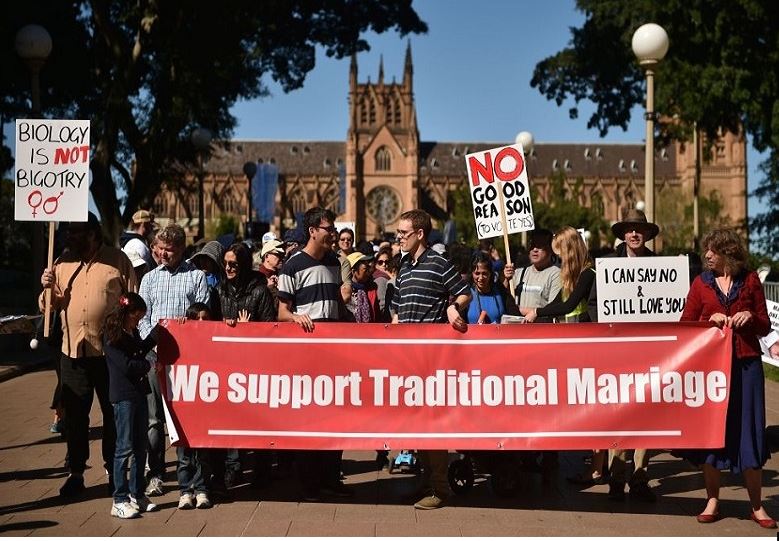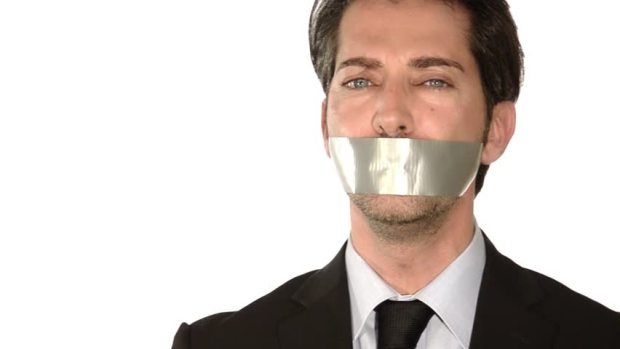The passing of “emergency” anti-vilification laws on Tuesday is our parliament’s declaration to the world that it doesn’t trust Australians to conduct a civil debate. That’s right, the government of one of the world’s longest-existing and most peaceful modern democracies threatens its own citizens with fines of up to $12,600 if they engage in what many people unhelpfully call “vilification” during the national debate on same-sex marriage.
A government spokesperson has affirmed, “It will be unlawful to vilify, intimidate or threaten to harm a person either because of views they hold on the survey or in relation to their religious conviction, sexual orientation, gender identity or intersex status….”
Anyone would think that there was a national emergency like the one described in the Little Children are Sacred report of 2007, which promptly led the parliament to suspend the Racial Discrimination Act (1975) and make special rules for Indigenous communities.
So does this mean that if Tim Minchin performs his charming little ditty calling opponents of same-sex marriage “bigoted c–ts” he could fall foul of the new legislation? What about the charming Benjamin Law who publicly fantasises about sodomising pro-traditional marriage MPs. Does that count as vilification or intimidation? What about any instance in which a defender of traditional marriage is called a “bigot” and a “hater”? A bigot is morally akin to a racist, and to call someone a racist is a serious business indeed. Do such examples count as vilification? What about screaming at participants within an inch of their faces at traditional marriage rallies? Does that count as intimidation?
An online Oxford dictionary defines vilification as “Abusively disparaging speech or writing.” It goes on to list an example of its use: “the widespread vilification of politicians”. Oh dear, that’s a pretty low threshold and one that would certainly include the examples of speech in the above paragraph.
Truth be told, although I find the comments of the likes of Minchin, Law and countless other public defenders of same-sex marriage who deride their opponents as bigots and haters insulting and uncivil, I would never countenance the notion that the state should fine them for expressing their opinions. In fact, I cannot recall one prominent spokesperson for the ‘No’ campaign calling for the government to regulate speech. Advocates of traditional marriage just get on with it knowing that copping abuse is part of the job.
My concerns with anti-vilification laws are not owing to any doubt that some speech should be regulated, but to my growing doubt that many within our culture, including our cultural elites, are still able to tell the difference between speech that genuinely harms and speech that merely causes anger or hurt feelings.
There is, in fact, a good case to be made that certain expressions ought to be punishable even though they are not libellous or threatening. A good example would be former Northern Territory Senator Nova Peris who was told by an irate tweeter to “F— off” and then called a “black c—”. The tweeter then offered more racial abuse. The man was subsequently charged for his action and, in this writer’s opinion, rightly so.
But here’s the key, the Peris case and many others like it are cases of verbal abuse, name-calling, or what American jurists have called “fighting words”. Fighting words were defined by the US Supreme Court in 1942 to include “the lewd and obscene, the profane, the libellous, and the insulting or “fighting” words — those which by their very utterance inflict injury or tend to incite an immediate breach of the peace.” In other words, a verbal punch in the face, like being an Indigenous woman and being called a “black c—”.
Ideally, there is a legitimate place in legislation against fighting words-type speech. But the problem is that a culture has developed in the Anglophone West in which many people think that merely being confronted with ideas or images that they find objectionable is a violation of their rights, a kind of emotional violence.
Take the phenomenon of the University campus “safe space” – everyone different to the people in the “safe space” is by definition a potential threat to their safety. This mindset turns a society as civil and tolerant as Australia’s into Hobbes’ “war of all against all”. Thus, entrusting to human rights and anti-discrimination commissions the power to regulate “vilification” becomes more dangerous than ever in an age in which many people cannot distinguish between the outright abuse of the Peris case – “fighting words” – and hurt feelings, disapproval, and offence.
Think of the Catholic Archbishop Julian Porteous in 2015 being told by Tasmania’s Anti-Discrimination Commissioner that he may have breached that state’s anti-discrimination act – whose wording is nearly identical to 18C – by distributing a non-abusive pamphlet defending traditional marriage. Or the Bill Leak cartoon that he published in response to the degradation of Indigenous communities, which was not abusive and involved no name-calling, threats, or obscenity. Nonetheless, Leak’s cartoon earned him a file with the Australian Human Rights Commission. Recall the University of Queensland students who protested against what they considered to be reverse racial segregation in their University. Again, as in the other cases, the offending speech was not abusive or racist – indeed, it was satirical commentary on University policy – and yet the case was kept open with the Human Rights Commission for fourteen months.
Or more recently, take the case of “Andrew”, who is a student at an Australian University and who received permission from a stressed co-student to pray for him. A little later while both students were with a group of other students “Andrew” was challenged as to what he would say to a friend who told him he was gay. “Andrew” said words to the effect that he would tell his friend that he loved him but that he could not endorse what he was doing. “Andrew” was then suspended from his University for at least a semester and had disciplinary action recorded on his transcript for allegedly making his classmate feel unsafe. After legal representation, the University reversed its decision.
There is a disturbing factor here. None of these cases involved anything like hateful abuse, and yet these cases were taken seriously as potential vilification by anti-discrimination and human rights commissioners as well as University discipline committees.
But how does it come about that people fail to see an immediate difference between the abusive nature of the speech directed at Peres and the kind of speech uttered by Bishop Porteous, Bill Leak, the UQ students, and “Andrew”?
The problem is that the discourse of identity politics has convinced members of minority groups that they are victims in a perpetual struggle against their white, heterosexual, male oppressors. In other words, drum into people’s brains that they are identity warriors and they’ll start seeing everyone not like them as an enemy out to hurt them. In this bellicose interpretative framework words that are confronting are perceived as violent attacks that must be met in a similarly non-rational coercive way – i.e., coercive speech regulations.
The objectionable thing about the “emergency” law passed by parliament against vilification in the same-sex marriage debate is not simply the law itself. It is the groundless assertion that there is an “emergency” in Australia that requires immediate intervention. This merely confirms in the minds of many that they are under siege when in actual fact they are merely being exposed to ideas that they find deeply disagreeable.
Stephen Chavura lectures in politics and history at Macquarie University, Campion College, and the Lachlan Macquarie Institute
Got something to add? Join the discussion and comment below.
Got something to add? Join the discussion and comment below.
Get 10 issues for just $10
Subscribe to The Spectator Australia today for the next 10 magazine issues, plus full online access, for just $10.


























Comments
Don't miss out
Join the conversation with other Spectator Australia readers. Subscribe to leave a comment.
SUBSCRIBEAlready a subscriber? Log in